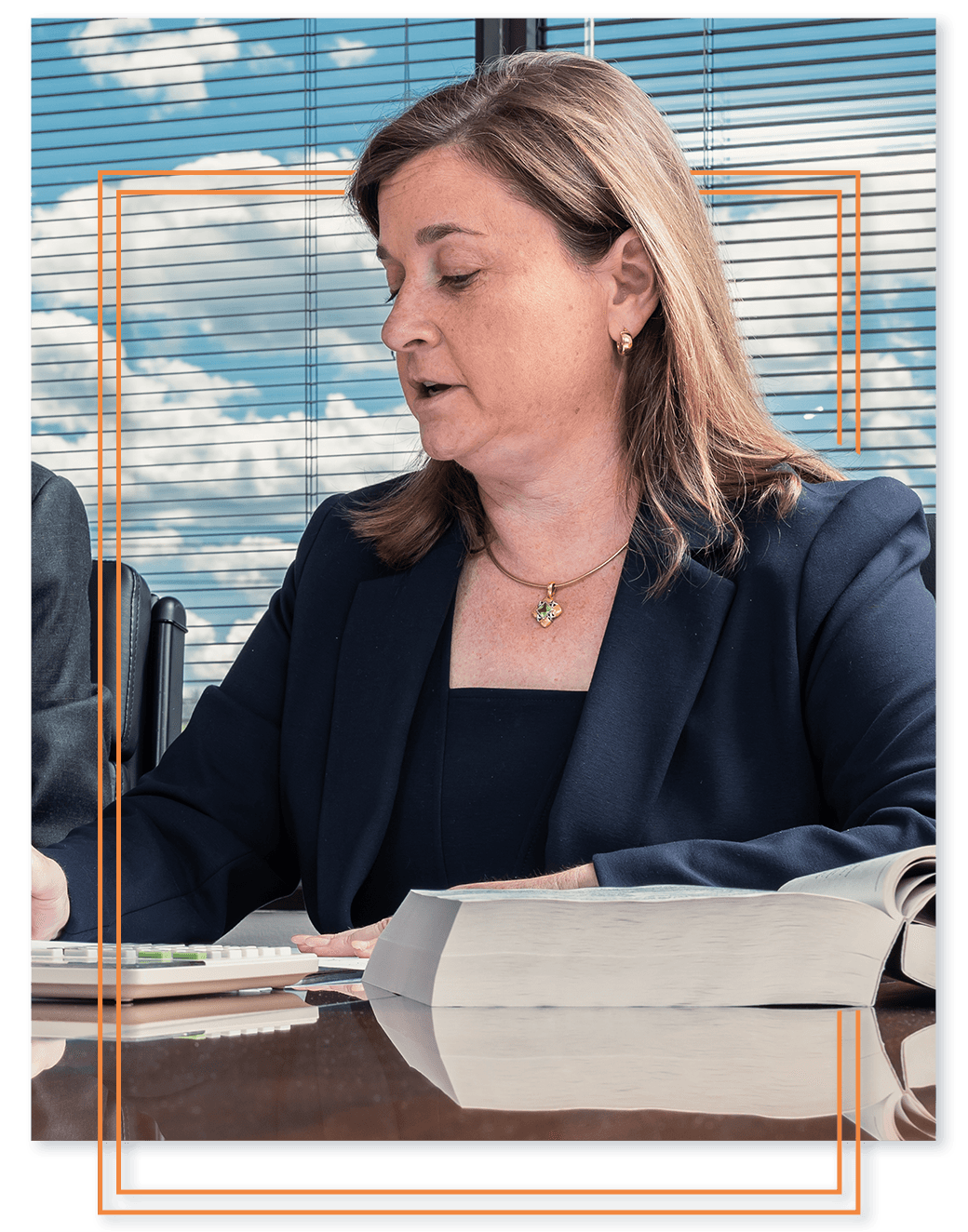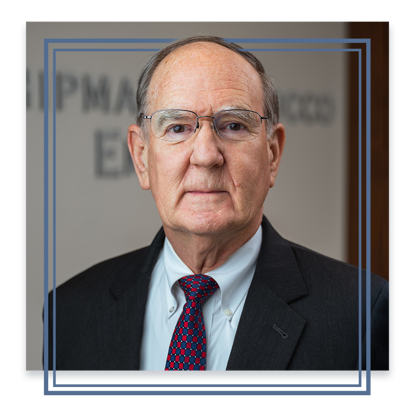
Your Family's Future

About Chipman Mazzucco Emerson's Practice for Individuals
Estate Planning and Probate Lawyer in Fairfield County
Helping Danbury, Southbury, & Westport Clients Create Strong Wealth Management Systems
Wealth transfer planning can be complex. Using the latest techniques, we advise clients on the judicious use of gifts, wills, and trusts during their lifetime and upon death. In addition to preparing documents, the estate planning attorneys at Chipman Mazzucco Emerson frequently give advice regarding:
- Estate, gift, and income tax strategies
- The disposition of unique assets, including interests in closely held businesses
- Business ownership and succession strategies
- Plans for life insurance and long-term care insurance
- Guidance regarding the disposition of IRAs, 401(k)s, and other retirement accounts
- Selection of executors, trustees, and guardians
- The use of charitable trusts and foundations
- Creditor protection
Our firm understands the specific needs of residents in Fairfield County, considering local property laws and regulations, which can significantly impact estate planning. We work closely with our clients to navigate these complexities, ensuring peace of mind and security for their assets and families.
If you are seeking assistance with any of these matters, we invite you to contact our team. With over 40 years in business, our firm has helped many individuals find the best solutions for themselves and their families.
Ready to protect what matters most? Our estate planning attorneys bring over 40 years of experience tailored to local laws and your family's unique needs. Reach out or call (203) 902-4882
Understanding Fairfield County Estate Laws
Fairfield County, like the rest of Connecticut, operates under specific laws governing estate planning and probate. Connecticut's probate courts ensure that a decedent's assets are distributed according to their will or, in the absence of a will, state law. Navigating these courts requires a precise understanding of the procedures and necessary documentation. At Chipman Mazzucco Emerson LLC, we guide clients through these requirements, ensuring compliance and efficiency.
Moreover, estate planning in Connecticut often considers factors such as the state’s estate and gift tax laws, which may affect the transfer of wealth. Staying informed about these regulations is crucial for minimizing tax liabilities and preserving wealth for future generations. Our estate planning lawyers in Fairfield County are well-versed in these laws and adept at crafting plans that legally optimize asset distribution.
Choosing an Estate Planning Attorney in Fairfield County
When you begin looking for help with your will, trusts, or probate needs, you may find many lawyers to choose from, but not all offer the same level of guidance or local knowledge. It is important to work with a firm that understands how Fairfield County's property values, family-owned businesses, and multigenerational households affect long-term planning. By meeting with us at Chipman Mazzucco Emerson LLC, you can discuss your goals in detail and learn how an estate planning attorney that Fairfield County residents trust approaches issues such as taxes, guardianship, and asset protection.
Our estate planning attorneys in Fairfield County routinely appear in local probate courts, including courts that handle matters arising in Danbury, Westport, and surrounding communities. This familiarity with court expectations and Connecticut procedures allows us to structure your documents so they are more likely to be processed smoothly and without avoidable delays. We also take time to coordinate with your financial and tax advisers, so your legal plan aligns with investment, retirement, and business strategies rather than existing in isolation.

Why You Need An Estate Plan
After a lifetime of working hard to support your family, a strong estate plan can safeguard the fruits of your labor. Conversely, a weak one can lead to disputes, excessive taxes, and other unwanted diversions.
By taking the time and effort necessary to plan your estate, you will be able to:
1. Specify family members and friends as your beneficiaries, thereby preventing your assets from ending up with strangers, antagonists, or the undeserving. Without an estate plan, state law decides who gets your assets. Only you (not a court or your state legislature) know who is deserving, who needs special help, and who does not. You can also achieve your philanthropic goals by naming religious, educational, and other charitable organizations as beneficiaries.
2. Appoint a guardian for your minor children. If you are the parent of small children, you need to prepare for the unthinkable possibility of leaving them prematurely. In your will, you can specify who should raise your children if you pass away while they are young. Without a will that names a guardian, the courts will step in to determine one.
3. Choose executors and trustees for your estate. Your estate plan is only as good as the people you name to carry out the instructions you leave in your will or revocable living trust. If you fail to make a selection, a court will do so for you.
4. Reduce risk of conflict and ease the strain on your family. As part of the estate planning process, you will make important decisions about your healthcare and who will make healthcare decisions for you; how to plan and deal with your own incapacity and who will make related decisions for you; what kind of funeral arrangements you want; who inherits your property; who carries out the instructions in your will or revocable living trust; and who will be the guardian of your children.
Every decision you make and express clearly will reduce the risk of conflict among your survivors.
5. Reduce delay and cost. Good estate planning minimizes the delays and costs of transferring property to beneficiaries. When survivors disagree, each party incurs legal fees, carrying costs mount, beneficiaries are denied access to assets, and fiduciary fees grow. Even if no conflict arises, however, the following simple planning steps will minimize delays and costs: (a) prepare a properly drafted will or revocable living trust; (b) nominate qualified people or financial institutions as executors and trustees; (c) provide quick access to cash (via a revocable living trust or other means) to cover early expenses and necessary support for survivors; (d) provide a way to raise cash to satisfy debts, expenses, taxes, and legacies; and (e) take steps to reduce estate and income tax obligations that arise from death.
6. Provide for special circumstances, including arrangements for any beneficiary who requires extraordinary help and guidance. The most common special circumstances that may affect estate planning decisions are:
- Blended families: How do you reconcile the desire to provide for a spouse with the desire to provide for children of a prior marriage?
- A beneficiary’s unhappy marriage: Will the beneficiary’s divorce expose their inheritance to claims of the divorcing spouse?
- A beneficiary’s creditors: Will the beneficiary’s creditors become the ultimate recipients of the inheritance?
- A beneficiary who is receiving public assistance: Will the inheritance disqualify the beneficiary for assistance, or will the government take your bequest for reimbursement?
- A beneficiary who suffers from a mental or physical disability
- A beneficiary’s immaturity: Is the beneficiary too young or immature to manage the inheritance?
- A spendthrift beneficiary: Will the beneficiary waste the inheritance by spending it extravagantly or irresponsibly?
As part of the estate planning process, you can provide for the beneficiary while shielding the assets from the risks associated with such special circumstances.
7. Provide for special assets. The management and disposition of certain assets will require special knowledge, skills, and attention. For example, business assets require knowledge of the business’s employees, customers, products, regulatory environment, and markets.
Your valuable collections of art, coins, precious metals, jewelry, photographs, antiques, firearms, and all the other fascinating trinkets and gadgets that people collect require special knowledge and attention to preserve and realize their monetary or subjective value. Authors, artists, inventors, and designers may have intellectual property (patents, copyrights, and trademarks) that requires special attention. Digital assets present new opportunities and risks.
As part of the estate planning process, you can provide special instructions for the management and disposition of such assets; appoint the proper person (your executor or trustee) who will be responsible for managing, liquidating, or distributing such assets; and guide consultants, appraisers, and brokers who may be helpful to your executor or trustee.
Every estate plan is unique, reflecting the diverse interests and assets of our clients across Fairfield County and beyond. At Chipman Mazzucco Emerson LLC, we encourage clients to engage in comprehensive planning that anticipates changes in family dynamics, financial circumstances, and legal landscapes. By starting early and regularly reviewing your plan, you can ensure it continues to serve your interests over time.
Estate Planning for Fairfield County Residents
In Fairfield County, residents benefit from personalized estate planning services that take into account local economic factors and property values. At Chipman Mazzucco Emerson LLC, we understand that for many, real estate represents a significant portion of the estate. Our firm strategizes on how best to utilize and preserve this asset class within the framework of Connecticut's legal standards.
With the affluent communities and high property values characteristic of the region, inheritance and estate taxes can often become a concern for residents. Our planning approaches aim to mitigate these concerns by implementing trusts and gifting strategies that align with individual goals and legal requirements.

Meet Our Estate Planning Attorneys
Helping You Secure a Better Future for Your Family

Blogs About Estate Planning
Our legal team at Chipman Mazzucco Emerson is committed to keeping individuals and business owners informed on legal matters that might impact their investments and estate planning goals. That is why we regularly write and update blogs on various topics that can help our clients and people in the communities we serve better understand their rights and options under the law. Please click the tab below to view any of the blogs in our archives.
Additionally, our blog serves as a platform to share insights from our retirement planning attorney on the evolving laws affecting estate and retirement planning in Fairfield County. We cover practical tips, legislative updates, and local developments that could impact your planning strategies—empowering you with the knowledge needed to make informed decisions for your future.
Tax Planning
For individuals and business entities in Connecticut and New York, our retirement planning attorney and estate planning team—often collaborating with our business attorneys—provide comprehensive tax planning strategies aimed at reducing income, gift, and estate taxes. We advise closely held businesses, executives, and individuals on the business and tax aspects of estate planning techniques, including retirement planning, business entity formation, business succession planning, and tax-exempt entities. Further, we regularly represent clients before the Internal Revenue Service (IRS) and state tax authorities.
Our approach emphasizes proactive, forward-looking strategies that anticipate shifts in tax law and economic conditions. By connecting current tax obligations with long-term financial goals, our retirement planning lawyer helps craft plans that preserve wealth and support sustainable growth.
Dispute Resolution
Disputes sometimes develop between fiduciaries, the beneficiaries to whom fiduciaries owe a duty, and tax authorities. In representing clients involved in such disputes, we try to negotiate prompt and fair resolutions. When we cannot, we are prepared to advance our clients’ interests in the probate courts and all other appropriate forums. Our litigation lawyers are well-positioned to handle controversies in all local courts, the United States Tax Court, district courts, and the Court of Federal Claims.
Our dispute resolution process prioritizes amicable settlements that respect the intentions of the decedents while addressing the concerns of beneficiaries. We employ a range of mediation and arbitration techniques, demonstrating our commitment to preserving family unity and financial stability.
Planning For Incapacity
Planning for incapacity is an important part of our mission. In addition to preparing living wills, powers of attorney, designations of conservator, and revocable living trusts, we counsel clients on qualification for public assistance (frequently referred to as “Medicaid” or “Title XIX” planning) and probate court proceedings relating to incapacity.
Our services in this area include:
Understanding the probability of life-altering events, we strive to align your estate plans with specific incapacity scenarios, giving you control over your future even if the unexpected happens. This approach prepares you for transitions, ensuring that your preferences guide crucial decisions about your healthcare and living situation.
Estate Planning Services in Fairfield County
If you haven’t thought about your legacy, your family may end up in a confusing legal tangle should the worst happen. Chipman Mazzucco Emerson can help you get started. Depending on your situation and desires, we can help you determine the best way to see your family is cared for and your wealth preserved.
Learn more about how we can help you with:
- Wills and disposition of assets
- Trusts
- Living trusts
- Estate administration
- Estate taxes
- Protection of minors
Wills & Living Trusts
Although most clients use a will to dispose of their assets upon death, for some, revocable trusts (often known as “living trusts”) can best achievetheirr objectives.
Living trusts frequently take the place of wills, directing the distribution of the bulk of a client’s assets upon death. Clients who wish to avoid a lengthy probate process, or to obtain active management of their assets at the time of incapacity, favor living trusts. For clients who own real property in other states, living trusts can also avoid multiple probate proceedings.
If a client chooses to establish a living trust, we assist in retitling assets and changing beneficiary designations to implement a comprehensive estate plan.
Our role in managing these processes further extends to guiding our clients in providing transparent communication with designated trustees and family members, fostering a cooperative environment that aligns with each client's values and expectations.
Irrevocable Trusts
The estate planning attorneys in Fairfield County regularly devise and implement tax planning strategies that may include a variety of irrevocable trusts, such as charitable remainder trusts, charitable lead trusts, grantor retained annuity trusts, grantor retained income trusts, irrevocable life insurance trusts, “intentionally defective” irrevocable trusts, qualified personal residence trusts, and “dynasty trusts.” There are multiple instruments you may use, depending on your needs.
Irrevocable trusts can offer substantial tax savings and asset protection benefits. They are designed to secure financial futures while honoring your personal intentions for wealth distribution. Our team collaborates to tailor these instruments in ways that reflect our clients’ values and optimize the transfer of wealth to future generations.
Probate Practice & Estate & Trust Administration
The probate lawyers at Chipman Mazzucco Emerson advise Connecticut and New York executors and trustees in settling decedents’ estates and administering trusts. We help fiduciaries pay debts and taxes and distribute the remaining assets to designated beneficiaries. The probate process typically includes:
- The probate proceeding and preparation of all probate documents
- Important post-mortem tax planning (disclaimers, tax elections, retirement account distribution requirements, etc.)
- Preparation of federal and state estate tax returns
- Preparation of fiduciary income tax returns
- Fiduciary accounting services
We understand that probate and estate administration matters involve the loss of a loved one, and we strive to make the estate settlement process as simple and stress-free for our clients as possible. Depending on the needs of the client, our involvement can range from occasional meetings and guidance to handling each step of estate settlement from start to finish.
Our estate planning attorneys also advise and represent beneficiaries of estates and trusts regarding their rights and remedies if losses or breaches of fiduciary duties occur.
Start the Estate Planning Process Today
Our estate planning lawyers in Fairfield County help clients preserve wealth, manage assets, and efficiently transfer property to their chosen beneficiaries during their lifetime and upon death. We can assist you in formalizing your requests in case of incapacity. No matter what you decide, it’s incredibly important to clearly communicate your desires, so there is no room for dispute. Our estate planning attorneys know how to create the necessary documentation and make your last wishes crystal clear.
Chipman Mazzucco Emerson has been serving clients in Connecticut and New York for over 40 years. We have the skill and experience to make your estate planning process move smoothly. Whether you already know what you want or you are looking for solid counsel, our team can help.
By reaching out, you take the first step towards a personalized estate plan that reflects your goals, secures your legacy, and provides security for your loved ones. Our consultations are designed to answer your pressing questions and set you on the path to comprehensive asset protection and seamless wealth transfer.
Frequently Asked Questions
What Does an Estate Planning Attorney Do?
An estate planning attorney assists clients in creating plans that manage and transfer their assets during their lifetime and after death. This includes drafting wills, setting up trusts, developing asset protection strategies, and addressing tax considerations. They provide guidance on how to best protect beneficiaries and ensure the efficient distribution of the estate. At Chipman Mazzucco Emerson LLC, our attorneys use a collaborative approach to align legal solutions with clients' unique objectives, ensuring that the estate plan comprehensively reflects their wishes.
How Often Should I Update My Estate Plan?
It's advisable to review and update your estate plan every three to five years or whenever significant life changes occur, such as marriage, divorce, the birth of a child, or changes in financial status. Keeping your plan current ensures that it remains aligned with your current situation and intentions. At Chipman Mazzucco Emerson LLC, we recommend regular check-ins to address any new legal developments or personal circumstances that may impact your strategy.
Why is a Living Trust Beneficial?
A living trust can be beneficial as it allows the estate to avoid probate, ensuring a faster and potentially more private distribution of assets. It also provides for the management of assets during the grantor's lifetime, particularly in the event of incapacity. This flexibility and efficiency make it a favored tool for many clients looking to streamline their estate plans. Our firm aids clients in establishing living trusts that are customized to their specific needs and financial objectives.
Call us today at (203) 902-4882 or email one of our lawyers today. Our estate planning attorneys want to know what we can do for you.










